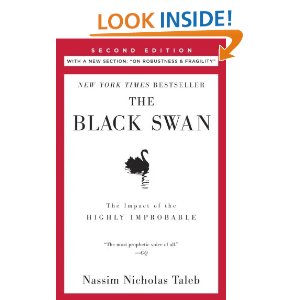Shared by JohnH
HatTip to Dave Lull.
Someone has come up with a nice parable that illustrates what reading Taleb did for me. Imagine the human mind as a house full of windows to the outside. As long as you are in the house, your understanding of the outside is dependent on your access to the windows. Assuming the outside is important to you, would you not want access to as many windows as possible, preferably clean ones? Reading Taleb showed me (1) that there were many windows in my house, not just the one or two I had been using, and (2) that all of them were very dirty, such that it was better to talk about the potential rather than the actual when speaking of things outside. Essentially, reading Taleb turned me into an epistemological agnostic: I became more aware of the powers and limitations of my mind, and consequently less certain of everything; some things dropped off my radar almost entirely. Why talk seriously about saving the universe or some eternal essence of me long-term when I do not even know how to save the bacon here and now? I began to shut up and listen even more than I used to; other points of view became valuable when they disagreed rationally with an emotional judgment of mine, and useless when they made emotional appeals against my rational judgment. Returning to the parable of the house helps make sense of what was going on. Before I knew about the multitude of windows, I had only one or two (that were really dirty, remember), so when someone said, "Look, there's a little pink unicorn in the garden!" I would peer through the glass, get a glimpse of something and think to myself, "Yeah, that could be a unicorn, and it does look rather pink." After Taleb took me on the grand tour of the house, the process of verification became more complicated. I had to visit all the windows before making a pronouncement. Comparing one view with another, I would say something like this: "Yeah, the smudge on this window creates a blotch that makes whatever-it-is look horned, and the tinge of the dirt makes it seem pink, but that other window upstairs has a different pattern of smudges in different colors, and everyone up there is convinced we have a brown rabbit in the garden, rather than a pink unicorn. Seen from the west wing it looks more like a blue panda." A quicker way to convey this shift in perspective is to emend the famous quote from Descartes, who should have said cogito, ergo idiota sum (“I think, therefore I am an idiot"). Thinking no longer confirms what I already know (in my gut); instead, it provides evidence that I don't really know anything (because gut-sense is really nonsense; unfortunately, it is also the inalienable factor in most human decisions).
